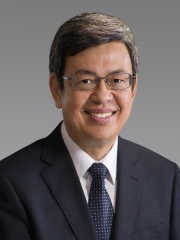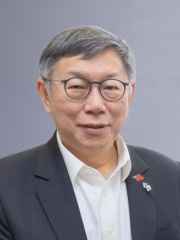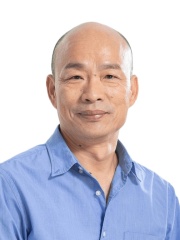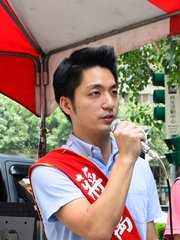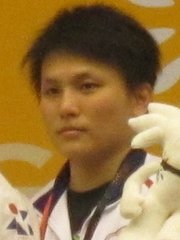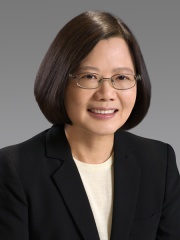
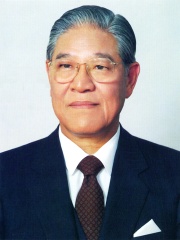
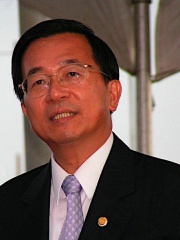
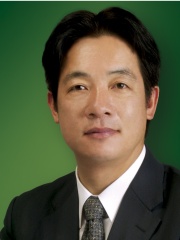
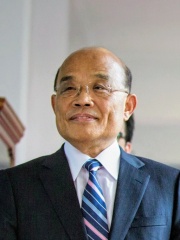
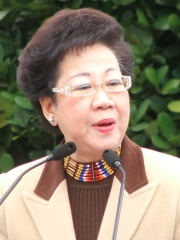
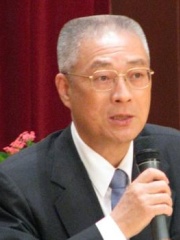
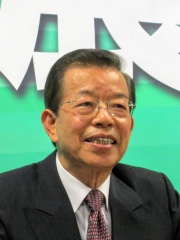
The Most Famous
POLITICIANS from Taiwan
This page contains a list of the greatest Taiwanese Politicians. The pantheon dataset contains 19,576 Politicians, 27 of which were born in Taiwan. This makes Taiwan the birth place of the 97th most number of Politicians behind Myanmar (Burma), and Kyrgyzstan.
Top 10
The following people are considered by Pantheon to be the top 10 most legendary Taiwanese Politicians of all time. This list of famous Taiwanese Politicians is sorted by HPI (Historical Popularity Index), a metric that aggregates information on a biography's online popularity. Visit the rankings page to view the entire list of Taiwanese Politicians.

1. Tsai Ing-wen (b. 1956)
With an HPI of 70.91, Tsai Ing-wen is the most famous Taiwanese Politician. Her biography has been translated into 97 different languages on wikipedia.
Tsai Ing-wen (Chinese: 蔡英文; pinyin: Cài Yīngwén; born 31 August 1956) is a Taiwanese politician and legal scholar who served as the seventh president of the Republic of China from 2016 to 2024. A member of the Democratic Progressive Party (DPP), she intermittently served as chair of the DPP from 2008 to 2012, 2014 to 2018, and 2020 to 2022. She was the first woman to hold the presidency in Taiwan's history. Tsai was born in Taipei and earned bachelor's and master's degrees in law from National Taiwan University and Cornell University, respectively. She went to England to study law at the London School of Economics, where she received a PhD in 1984, and became a law professor. In 1993, she was appointed to a series of governmental positions by the ruling Kuomintang (KMT) party and was one of the chief drafters of the special state-to-state relations doctrine under President Lee Teng-hui. During the first term of Chen Shui-bian's presidency, Tsai served as Minister of the Mainland Affairs Council. She joined the DPP in 2004 and served briefly as a party member of the Legislative Yuan. She was appointed as Vice Premier under Su Tseng-chang but resigned in 2007. Following the DPP's defeat in the presidential election in 2008, she was elected as party chair of the DPP, but she resigned when the party lost the presidential election in 2012. Tsai ran for New Taipei City mayorship in the 2010 municipal elections but was defeated by the KMT candidate, Eric Chu. In April 2011, Tsai became the first woman to be nominated by a major party as a presidential candidate in the history of Taiwan after defeating her former superior, Su Tseng-chang, in the DPP's primary election by a slight margin. In the 2012 Taiwanese presidential election, she was defeated by incumbent president Ma Ying-jeou, but she won her first term of presidency in the 2016 presidential election by a landslide in a rematch against Eric Chu, becoming the first woman to serve as Taiwan's president. In the 2020 presidential election, she was re-elected as president after winning the election against Han Kuo-yu. She was succeeded as president by Lai Ching-te.

2. Lee Teng-hui (1923 - 2020)
With an HPI of 70.07, Lee Teng-hui is the 2nd most famous Taiwanese Politician. His biography has been translated into 49 different languages.
Lee Teng-hui (Chinese: 李登輝; pinyin: Lǐ Dēnghuī; 15 January 1923 – 30 July 2020) was a Taiwanese statesman, economist, and agronomist who served as the president of the Republic of China and chairman of the Kuomintang from 1988 to 2000. He was the first president to be born in Taiwan, the last to be indirectly elected, and the first to be directly elected. Born in Taihoku Prefecture, Lee was raised under Japanese rule. He was educated at Kyoto Imperial University and served in the Imperial Japanese Army during World War II before graduating from National Taiwan University. He then studied agricultural economics in the United States, where he earned his doctorate from Cornell University in 1968, beginning a career as an economics professor. As a member of the Kuomintang (KMT), he was appointed Mayor of Taipei in 1978 and became governor of Taiwan Province in 1981 under President Chiang Ching-kuo. Lee succeeded Chiang as president after Chiang's death in 1988. During his presidency, Lee oversaw the end of martial law in Taiwan and led reforms to democratize the Republic of China. He was an advocate of the Taiwanese localization movement, sought to establish greater international recognition of the country, and has been credited as the president who completed Taiwan's democratic transition. After leaving office, he remained active in Taiwanese politics as a major influence on the pro-independence Taiwan Solidarity Union (TSU), and recruited for the party in the past. After Lee campaigned for TSU candidates in the 2001 Taiwanese legislative election, he was expelled by the KMT. His post-presidency was also marked by efforts to maintain greater relations between Taiwan and Japan.

3. Chen Shui-bian (b. 1950)
With an HPI of 66.20, Chen Shui-bian is the 3rd most famous Taiwanese Politician. His biography has been translated into 52 different languages.
Chen Shui-bian (Chinese: 陳水扁; born 12 October 1950) is a Taiwanese politician and lawyer who served as the fifth president of the Republic of China from 2000 to 2008. Chen was the first president from the Democratic Progressive Party (DPP), ending the Kuomintang's (KMT) 55 years of continuous rule in Taiwan. He is sometimes referred to by the nickname A-Bian (阿扁). After graduating from National Taiwan University and practicing as a lawyer, Chen entered politics in 1980 during the Kaohsiung Incident as a member of the Tangwai movement and was elected to the Taipei City Council in 1981. In 1985, as the editor of the weekly pro-democracy magazine Neo-Formosa, he was jailed for libel following publication of an article critical of Elmer Fung, a college philosophy professor who was later elected a New Party legislator. After being released, Chen helped found the Democratic Progressive Party (DPP) in 1986 and was elected a member of the Legislative Yuan in 1989, and Mayor of Taipei in 1994. Chen won the 2000 presidential election on 18 March with 39% of the vote as a result of a split of factions within the Kuomintang, when James Soong ran for the presidency as an independent against the party nominee Lien Chan, becoming the first non-member of the Kuomintang to hold the office of president. Although Chen received high approval ratings during the first few weeks of his term, his popularity sharply dropped due to alleged corruption within his administration and the inability to pass legislation against the opposition KMT, who controlled the Legislative Yuan. In 2004, he won reelection by a narrow margin after surviving a shooting while campaigning the day before the election. Opponents suspected him of staging the incident for political purposes. However, the case was officially closed in 2005 with all evidence pointing to a single deceased suspect, Chen Yi-hsiung. In 2009, Chen and his wife Wu Shu-chen were convicted on two bribery charges. Chen was sentenced to 19 years in Taipei Prison, reduced from a life sentence on appeal, but was granted medical parole on 5 January 2015. Chen's supporters have claimed that his trial and sentencing were politically motivated retribution by the Kuomintang for his years in power.

4. William Lai (b. 1959)
With an HPI of 65.45, William Lai is the 4th most famous Taiwanese Politician. Her biography has been translated into 52 different languages.
Lai Ching-te (Chinese: 賴清德; pinyin: Lài Qīngdé; born 6 October 1959), also known as William Lai, is a Taiwanese politician, physician, and nephrologist who has served as the eighth president of the Republic of China since 2024. A member of the Democratic Progressive Party (DPP), he has been the party's chairman since 2023. Lai was born in Taipei County to a working-class family. He studied medicine at National Taiwan University, National Cheng Kung University, and, in 2003, earned his master's degree from Harvard University in public health. After practicing medicine as a spinal cord injury expert, Lai ran in the 1996 Legislative Yuan election, winning a seat representing Tainan City. After being re-elected to the Legislative Yuan four consecutive times, he successfully ran for Mayor of Tainan in 2010 and served as mayor for seven years, winning reelection in 2014. In September 2017, President Tsai Ing-wen announced Lai would replace outgoing premier Lin Chuan. On 24 November 2018, Lai announced his intention to resign from the premiership after the Democratic Progressive Party suffered a major defeat in local elections, and left office on 14 January 2019 after the swearing-in of his successor Su Tseng-chang. Lai mounted an unsuccessful challenge against Tsai Ing-wen in the 2019 Democratic Progressive Party presidential primary, then served as her running mate in the 2020 Taiwan presidential election. In April 2023, Lai was nominated by the DPP as their presidential candidate for the 2024 presidential election and was elected with 40.05% of votes. He took office as president on 20 May 2024.
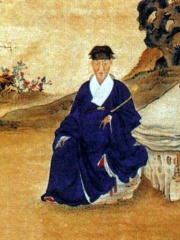
5. Zheng Keshuang (1670 - 1707)
With an HPI of 61.13, Zheng Keshuang is the 5th most famous Taiwanese Politician. His biography has been translated into 18 different languages.
Zheng Keshuang, Prince of Yanping (Chinese: 鄭克塽; Pe̍h-ōe-jī: Tēⁿ Khek-sióng; 13 August 1670 – 22 September 1707), courtesy name Shihong, art name Huitang, was the third and last ruler of the Kingdom of Tungning in Taiwan in the 17th century. He was the second son of Zheng Jing and a grandson of Koxinga (Zheng Chenggong). After surrendering to the Qing dynasty in 1683, he was ennobled as Duke of Hanjun (漢軍公), and lived the rest of his life in Beijing.

6. Su Tseng-chang (b. 1947)
With an HPI of 58.06, Su Tseng-chang is the 6th most famous Taiwanese Politician. His biography has been translated into 30 different languages.
Su Tseng-chang (Chinese: 蘇貞昌; pinyin: Sū Zhēnchāng; Pe̍h-ōe-jī: So͘ Cheng-chhiong; born 28 July 1947) is a Taiwanese politician who served as premier of the Republic of China (Taiwan) from 2006 to 2007 and again from 2019 to 2023. He was the chairman of the Democratic Progressive Party in 2005 and from 2012 to 2014. Su served as Chief of Staff to President Chen Shui-bian in 2004. He is currently the longest-serving Democratic Progressive premier in history. Su actively campaigned for the DPP presidential nomination in 2008, but finished second to Frank Hsieh. Su eventually teamed with Hsieh as the vice presidential nominee; the DPP lost to the Kuomintang ticket of Ma Ying-jeou and Vincent Siew. Su ran for Taipei City Mayor in November 2010, but lost to the incumbent Hau Lung-pin by a 12-point margin. Su campaigned for the 2012 presidential candidacy of the DPP in 2011, but lost to Tsai Ing-wen by a very narrow margin. Following the loss of Tsai to Ma Ying-jeou, Su was elected to succeed Tsai as DPP chairman in 2012. During the Chen administration, Su, along with politicians Annette Lu, Frank Hsieh and Yu Shyi-kun, are collectively known as the "Big Four of the Democratic Progressive Party". Su is nicknamed the "Lightbulb" or "E Ball" (電火球) and "Go Go Go" (衝衝衝) by the Taiwanese media and DPP voters, a nickname he earned in the 1980s for his charismatic approach to campaigning during election season, in addition to being an affectionate reference to the balding Su.

7. Annette Lu (b. 1944)
With an HPI of 57.45, Annette Lu is the 7th most famous Taiwanese Politician. Her biography has been translated into 20 different languages.
Lu Hsiu-lien (Chinese: 呂秀蓮; pinyin: Lǚ Xiùlián; Pe̍h-ōe-jī: Lū Siù-liân; born 7 June 1944), also known by her English name Annette, is a Taiwanese politician and lawyer. A feminist active in the Tangwai movement, she joined the Democratic Progressive Party (DPP) in 1990 and was elected to the Legislative Yuan in 1992. Subsequently, she served as Taoyuan County Magistrate between 1997 and 2000, and was vice president of the Republic of China (Taiwan) from 2000 to 2008, under President Chen Shui-bian. Before entering politics, Lu graduated from National Taiwan University and earned law degrees from the University of Illinois Urbana-Champaign and from Harvard University. She announced her intentions to run for the presidency on 6 March 2007, but withdrew to support eventual DPP nominee Frank Hsieh. Lu ran again in 2012, but withdrew for a second time, ceding the nomination to DPP chairwoman Tsai Ing-wen. Lu lost the DPP's Taipei mayoral nomination to Pasuya Yao in 2018, and stated that she would leave the party. However, by the time Lu announced in September 2019 that she would contest the 2020 presidential election on behalf of the Formosa Alliance, she was still a member of the Democratic Progressive Party.

8. Wu Den-yih (b. 1948)
With an HPI of 56.76, Wu Den-yih is the 8th most famous Taiwanese Politician. His biography has been translated into 24 different languages.
Wu Den-yih (Chinese: 吳敦義, born 30 January 1948) is a Taiwanese politician. He graduated from National Taiwan University and worked as a journalist before beginning a career in politics with a 1973 appointment to the Taipei City Council. Wu was then elected Magistrate of Nantou County, serving from 1981 to 1989. Following two terms as magistrate, he was named Mayor of Kaohsiung in 1990. Wu remained mayor until 1998, having won the office in a 1994 direct election. He then served two full terms in the Legislative Yuan from 2002 to 2008. Shortly after winning a third term in the legislature, Wu was named Premier of the Republic of China in 2009. He served until 2012, when he and Ma Ying-jeou formed the Kuomintang (KMT) presidential ticket. Wu served as the tenth vice president of the Republic of China, stepping down in 2016. In May 2017, he was elected party chairman. Wu stepped down from the position in January 2020. Previously, Wu had served the KMT as secretary-general from 2007 to 2009, first vice chairman in 2014, and as acting chairman in 2014 and 2015.

9. Frank Hsieh (b. 1946)
With an HPI of 56.46, Frank Hsieh is the 9th most famous Taiwanese Politician. His biography has been translated into 19 different languages.
Frank Hsieh Chang-ting (Chinese: 謝長廷; born May 18, 1946) is a Taiwanese politician and former defense attorney who served as Ambassador of Taiwan to Japan from 2016 to 2024. A cofounder of the Democratic Progressive Party, he has served on the Taipei City Council, the Legislative Yuan, as the mayor of Kaohsiung City, and as the Premier of Taiwan (President of the Executive Yuan) under president Chen Shui-bian. Hsieh was the DPP nominee in the 2008 presidential election and was defeated by Ma Ying-jeou.
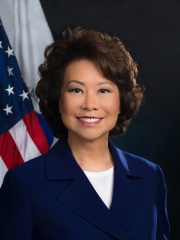
10. Elaine Chao (b. 1953)
With an HPI of 55.80, Elaine Chao is the 10th most famous Taiwanese Politician. Her biography has been translated into 38 different languages.
Elaine Lan Chao (Chinese: 趙小蘭; born March 26, 1953) is an American businesswoman and former government official who served as United States secretary of labor in the administration of George W. Bush from 2001 to 2009 and as United States secretary of transportation in the first administration of Donald Trump from 2017 to 2021. A member of the Republican Party, Chao was the first Asian American woman to serve in a presidential cabinet. She resigned as transportation secretary after the January 6 United States Capitol attack. Chao was born in Taipei, Taiwan, to waishengren parents who fled China as a result of the Chinese Civil War. She immigrated to the United States when she was eight years old. Her father founded the Foremost Group, an American shipping company based in New York. Chao was raised in Queens, New York, and on Long Island, and received degrees from Mount Holyoke College and Harvard Business School. She worked for financial institutions before being appointed to senior positions in the Department of Transportation under Presidents Ronald Reagan and George H. W. Bush, including chair of the Federal Maritime Commission (1988–1989) and Deputy Secretary of Transportation (1989–1991). She served as director of the Peace Corps from 1991 to 1992 and as president of the United Way of America from 1993 to 1996. Chao has served on several Fortune 500 and nonprofit boards of directors, including the electric charger network provider ChargePoint since 2021. She was named a Kennedy Center trustee in January 2025. She is married to U.S. senator Mitch McConnell.
People
Pantheon has 27 people classified as Taiwanese politicians born between 1670 and 1987. Of these 27, 25 (92.59%) of them are still alive today. The most famous living Taiwanese politicians include Tsai Ing-wen, Chen Shui-bian, and William Lai. The most famous deceased Taiwanese politicians include Lee Teng-hui, and Zheng Keshuang. As of April 2024, 6 new Taiwanese politicians have been added to Pantheon including Chiang Wan-an, Wu Hui-ju, and Chen Szu-yuan.
Living Taiwanese Politicians
Go to all RankingsTsai Ing-wen
1956 - Present
HPI: 70.91
Chen Shui-bian
1950 - Present
HPI: 66.20
William Lai
1959 - Present
HPI: 65.45
Su Tseng-chang
1947 - Present
HPI: 58.06
Annette Lu
1944 - Present
HPI: 57.45
Wu Den-yih
1948 - Present
HPI: 56.76
Frank Hsieh
1946 - Present
HPI: 56.46
Elaine Chao
1953 - Present
HPI: 55.80
Eric Chu
1961 - Present
HPI: 55.69
Chen Chien-jen
1951 - Present
HPI: 55.42
Ko Wen-je
1960 - Present
HPI: 55.40
Han Kuo-yu
1957 - Present
HPI: 55.16
Deceased Taiwanese Politicians
Go to all RankingsNewly Added Taiwanese Politicians (2025)
Go to all RankingsChiang Wan-an
1978 - Present
HPI: 47.30
Wu Hui-ju
1982 - Present
HPI: 39.22
Chen Szu-yuan
1981 - Present
HPI: 38.52
Liu Ming-huang
1984 - Present
HPI: 35.70
Lu Ying-chi
1985 - Present
HPI: 33.98
Wang Cheng-pang
1987 - Present
HPI: 33.89


